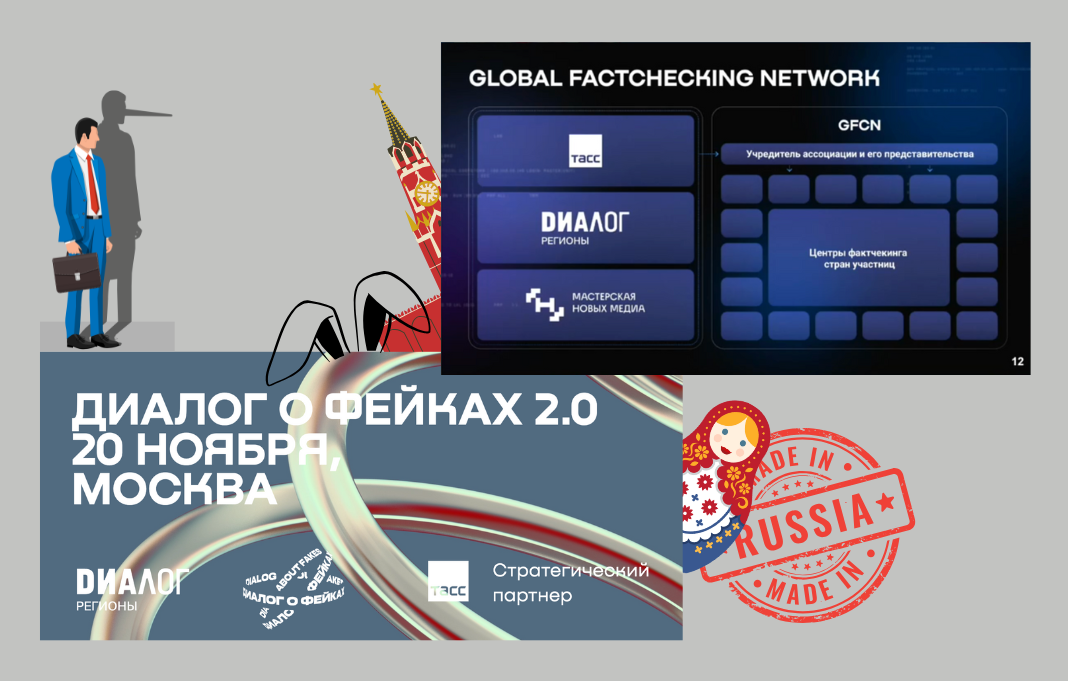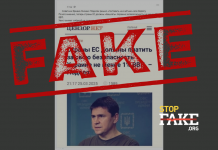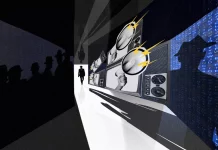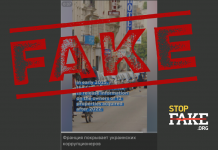The Kremlin has long used fact-checking as a weapon. Since the beginning of Russia’s full-scale war in Ukraine, Russians have launched many channels on Telegram and other social media that are supposedly engaged in “exposing Western propaganda” and “protecting the truth,” but in fact are promoting the same Russian disinformation narratives as always but from a different angle. This technique is intended to neutralize the efforts of real fact-checkers who work according to international standards and use facts, not propaganda templates, to debunk lies.
This was still not enough for the Kremlin, so now Russia wants to create a separate international “fact-checking association”, the so-called Global Fact-checking Network (GFCN), to unite those who share “Russian views and values.” One can only imagine what this list of values is that the Russian so-called “fact-checkers” are going to protect.
The creation of such a quasi-organization was the main goal of the so-called international forum “Dialogue on Fakes 2.0” held in Moscow on November 20, which essentially brought together all the main propagandists of the Kremlin and its supporters from around the world. The first, main panel of this gathering, which included the voice of the Russian Foreign Ministry, Maria Zakharova, Steven Seagal, one of the main propagandists from Telegram, Mikhail Zvinchuk (owner of the Rybar channel), as well as the CEO of the TASS agency, Andrei Kondrashov, and others, can say a lot about the level of the forum.
In addition to the usual lamentation that the West continues to aggressively “impose” its only correct point of view on others, while Russia remains an unchanging “fighter for the truth”, it was at this conference that they decided to announce the creation of a new international fact-checking association. The existing ones – meaning the global network IFCN, of which StopFake is a member, and its European counterpart EFCSN – are seen by Russians as “sometimes fulfilling only a political mission and sometimes having nothing to do with real objective fact-checking.” The Russian association, on the other hand, will be called upon to provide “a healthy alternative that will help make the world a better place.”
This “healthy alternative” was presented by Volodymyr Tabak, CEO of the non-profit organization Dialog. According to journalists’ investigations, Dialog is, among other things, spreading propaganda with money from the Russian budget, and during the full-scale war with Ukraine, Dialog switched to providing information support to the Russian Ministry of Defense. This is exactly what you need to unite truth activists around the world.
What did Tabak promise to do in the new association? First of all, to unite people like him – those “who share our views and values,” i.e., the views and values of the Kremlin and the Russian Defense Ministry. Secondly, Volodymyr Tabak promised to teach everyone fact-checking both offline and online, again based on his organization Dialogue. In addition to values and training, those “fact-checkers” who agree to join the Russian “healthy alternative” were also offered FREE access to a dashboard (something they claim is not available in other associations) where they can record and analyze fakes, label them and find other similar fake news. In fact, any professional fact-checking organization uses dozens of such platforms, and thanks to membership in an international association, they also have free access to them and other tools for verifying information, but it seems that Dialog has not conducted fact-checking to the end here. The dashboard itself resembles similar to other platforms that already exist, so there is no innovation or excitement here either.
Vladimir Tabak also emphasized that the Russian association will accept not only legal entities but also individuals. In fact, anyone who wants to “check fakes based on the values of Russian propagandists” will be able to become a member of the international fact-checking association. The list of participants in this event, i.e. potential members, already speaks for itself – these are regular authors of fakes that real fact-checkers from IFCN have to refute all the time.
It is also noteworthy that the other partner of this association is the TASS news agency, the main state propaganda machine of the Kremlin. TASS Director General Andrey Kondrashov, who signed the creation of this “association” with Tabak amidst fanfare, said that it could not be otherwise, because “it is the TASS agency that has a historical mission to verify facts.” That is why StopFake constantly refutes TASS fakes, including recently refuting a fake launched by TASS that allegedly Ukrainian soldiers looted the village of Glushkovo in Kursk region, although they were not physically there, and the looting was carried out by the Russian military, which was confirmed by residents. However, the TASS agency understands fact-checking to mean something completely different.
Finally, the founders of the international association even showed the code of a responsible fact-checker with the right words about objectivity and openness of methodology, which must be signed before joining the association. To emphasize that the Russian Association of fact-checkers is more open than its Western counterparts, Kondrashov even stated that “the American association annually checks its members for political loyalty,” because these organizations that are members of their association “only work out the interests of other countries.” However, this refers to an independent audit conducted by auditors from different countries, which checks, among other things, compliance with the principles of the code and standards, and an audit that TASS obviously would not have passed, but even here some fact-checking failed.
What is the result? In fact, Russia is intensifying the use of fact-checking as a weapon, actively offering its “truth”, “methodology” and vision of the world. By allowing any person sympathetic to Russia to become a “fact-checker,” the Kremlin is both discrediting what professionals do and fighting for those who are not only unsure of what to believe but also unsure whether they can trust those who are engaged in verifying information. This is another round of information warfare in the post-truth world, in which we will need to continue to fight for the facts.
Olena Churanova





